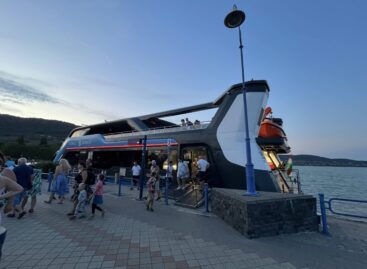MOHOSZ: Lake Balaton is the first in the catch ranking of Hungarian waters
Anglers caught 633 tons of fish from Lake Balaton last year, although the quantity was 9.8 percent lower than the 2023 value, but the lake still maintained its leading position in the catch ranking of large waters in Hungary – the Hungarian National Fishing Association (MOHOSZ) told MTI based on the 2024 unified annual statistics on angler presence, catch and settlement of fishing waters.
 The quantity of fish taken from the Ráckevei-Soroksári Danube branch amounted to 180 tons, while the quantity of fish taken from Lake Tisza, also thanks to its outstanding catfish catch, amounted to 160 tons.
The quantity of fish taken from the Ráckevei-Soroksári Danube branch amounted to 180 tons, while the quantity of fish taken from Lake Tisza, also thanks to its outstanding catfish catch, amounted to 160 tons.
The summary, compiled by the National Fishing Association Service Center and prepared with the assistance of the National Food Chain Safety Office, presents, among other things, the legal fish export opportunities and the results of the catches.
Based on the data, the MOHOSZ concluded that the perch population in Lake Balaton is still remarkable, but the sharply decreasing catch of garda, once considered a Balaton specialty, is a cause for concern. The fishing catch of Lake Velence is increasing thanks to overfishing (21.3 tons), but this water area is still particularly vulnerable.
Among rivers, the Tisza continues to lead the list, with a total catch of 343.5 tons last year. The Danube yielded 292 tons, while the Körösök system yielded 122.3 tons of fish, with the former reporting a positive increase in pike catches and the latter a positive increase in catfish catches.
The announcement states that the most important statistical data is the fishing catch recorded in the catch logs, which is the vast majority of the actual fish catch. The data also includes the selective catch of fishing competitions, recreational fishing, and the results of ecological, selective fishing. Last year, the total catch was 4,879 tons, of which the fishing catch amounted to 4,614 tons, an increase of 2.8 percent on an annual basis.
According to MOHOSZ, the intensive stocking of natural waters is a curiosity throughout Europe. In Hungary, this task is carried out almost exclusively by fishing organizations, and some of these stocking operations serve not only to ensure fish catch, but also to create ecological balance and diversity by transforming the stock structure, restocking native fish species, or partially compensating for the damage caused by cormorants.
Related news
Szallas.hu: Lake Balaton was a determining factor among domestic travelers last year
🎧 Hallgasd a cikket: Lejátszás Szünet Folytatás Leállítás Nyelv: Auto…
Read more >Related news
MOHU: 5,200 return points are in operation, but 47 larger settlements still do not have RE points – public “enema” machines may be introduced
🎧 Hallgasd a cikket: Lejátszás Szünet Folytatás Leállítás Nyelv: Auto…
Read more >









